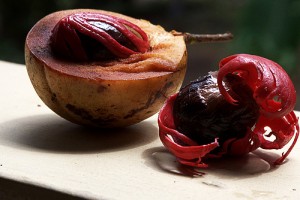Mace
Botanical Name: Myristica Fragrans
Folk Names: Jatiphala, Jatiphalam, Jatikosha, Jatipatri, Jatipatra, Jaiphal, Jayapatri, Javitri, Bicuiba Acu, Qoust, Sadhika, Wohpala

Photo by yumievriwan
Mace is the the bright, red aril which surrounds the nutmeg seed. Nutmeg is known for it’s abuse as a popular recreational psychoactive drug. Based on human study, mace extract, when used as part of a chewing gum, is said to decrease plaque and gingivitis. Not well studied in humans, mace extract may also have antibacterial, antifungal, anti-inflammatory, and anticancer effects. It is also popular in India, for treating measles. Not only is it used for medicine, but also in the kitchen and magic.
Deities: Ochun, Oya
Element: Air (Mental Powers, Physic Powers, Visions, Wisdom)
Gender: Masculine
Planet: Mercury (Divination, Mental Powers, Physic Powers, Wisdom)
Powers: Mental & Psychic Powers
Medicinal Uses: Mace has been used in many Chinese and Indian traditional medicines to treat the nervous and digestive system. The compounds in this spice, myristicin and elemicin have stimulant properties on the brain. The oil contains eugenol, and in dentistry, has been used to relieve toothaches and bad breath. It is also used to reduce muscular and rheumatic pain in joints. A fresh decoction with honey has been used to relieve nausea, gastritis, indigestion ailments.
Magical Uses: Carry Mace blade’s in a charm/sachet for luck, or to improve the intellect. Burn in incense to increase psychic power, or for creative work.
Other Uses: Mace has a delectable flavor, and will give a saffron-like orange-red color to the food items.
Warning: Mace is safe to take in small doses. In large amounts, it may result in hallucinations and can even cause cancer.
References:
Note: Consult with a Physician or a certified herbologist if you are seeking medical remedies. The information is not intended as medical advice. PagansWorld.org is not liable for the misuse of the herb listed above.
Thanks for stopping by! Well wishes to you all, have a great day!
Lisa







